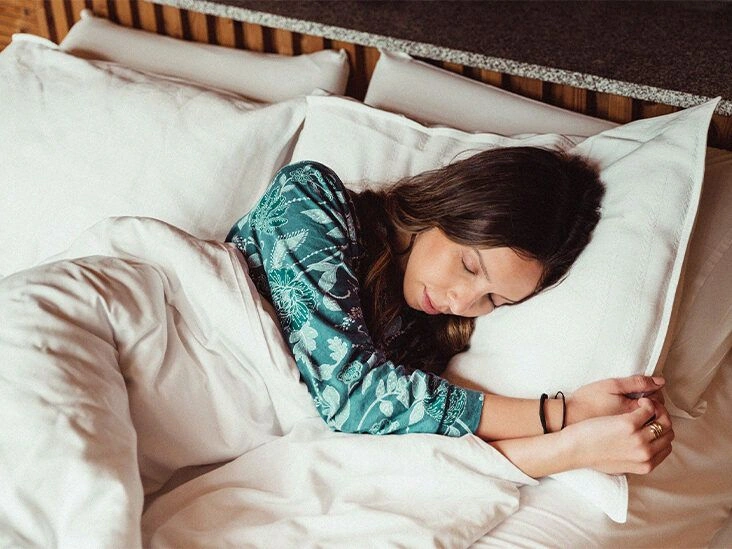Adjusting your eating habits and daily routine can improve sleep quality. Certain natural remedies and supplements may also be helpful.
Getting adequate sleep is as vital for your health as consistent exercise and a balanced diet.
Research shows that poor sleep adversely affects cognitive function, mood, cardiovascular health, immune function, and more. It also raises the risk of obesity, diabetes, and other chronic conditions.
Because of this, achieving restorative sleep is one of the most important steps you can take to enhance your overall health.
Below are 15 research-backed strategies to help you sleep more soundly at night.
1. Increase bright light exposure during the day
Spending time in natural sunlight or bright illumination during daytime helps maintain a healthy circadian rhythm, which in turn boosts daytime alertness and improves nighttime sleep duration and quality.
A number of studies indicate that daytime exposure to bright light can enhance both sleep quality and the amount of sleep you get. If getting outside daily isn’t feasible, consider using a bright light lamp or high-intensity bulbs.
An earlier study of over 100 office workers found that those with greater morning light exposure fell asleep faster in the evening—especially during winter months. They also showed better alignment of their internal clocks and improved sleep quality.
2. Reduce blue light exposure in the evening
Exposure to light at night can have the opposite effect of daytime light because it suppresses hormones such as melatonin, which promotes relaxation and deep sleep.
Blue light—emitted in large amounts by electronic screens like phones and computers—is especially disruptive.
Common ways to cut evening blue light exposure include wearing blue-light-blocking glasses and turning off TVs, phones, and other bright screens at least two hours before bedtime.
Learn more: Blue light and sleep.

3. Don’t consume caffeine late in the day
Caffeine can boost alertness, focus, and athletic performance, but a 2023 review found that consuming caffeine later in the day shortened total sleep time by about 45 minutes and reduced sleep efficiency by 7%.
This may be because caffeine can affect REM sleep, though findings on daytime caffeine and sleep are mixed.
To be cautious, avoid caffeinated drinks at least 8 hours before bedtime; if you use caffeine supplements, don’t take them within 13 hours of sleep time.
If you crave coffee in the late afternoon or evening, opt for decaffeinated versions.
Learn more: 6 foods that keep you awake at night.
4. Reduce irregular or long daytime naps
Brief power naps can be restorative, but long or irregular daytime sleeping can impair nighttime sleep.
Daytime sleep may disrupt your internal clock, making it harder to fall asleep at night.
However, the impact of napping varies. For instance, one study suggests naps may benefit athletes or those doing intense physical work and might not harm their nocturnal sleep quality.
If your daytime naps aren’t interfering with nighttime sleep, they’re likely fine. But if they’re causing problems, try shortening or limiting them.
»MORE:Download helpful tips to manage excessive daytime sleepiness.5. Try to sleep and wake at consistent times
Your circadian rhythm runs on a predictable loop tied to sunrise and sunset, so keeping consistent sleep and wake times helps preserve long-term sleep quality.
A 2020 review of 41 studies reported that late bedtimes and irregular sleep schedules were linked to poorer sleep quality.
If falling asleep is a challenge, try to establish regular times to go to bed and get up each day. After several weeks, you may not even need an alarm clock.
6. Take a melatonin supplement
Melatonin is a crucial sleep hormone that signals your brain to wind down. Melatonin supplements are widely used and can help people fall asleep more quickly.
The FDA does not regulate melatonin as a pharmaceutical, so quality and dosage can vary. Studies have investigated doses from 0.1 to 10 mg taken up to 2 hours before bedtime.
Start with a low dose and increase if needed, but consult a healthcare provider before beginning melatonin. Talk to a medical professional before giving melatonin to a child; long-term use in children is not well-studied.
Learn more: How to choose high quality vitamins and supplements.
7. Consider these other supplements
Several supplements may promote relaxation and help with sleep, including:
- magnesium
- nitrate
- omega-3 fatty acids
- resveratrol
- zinc
These aren’t cure-alls for sleep problems but can complement other sleep strategies. Try them one at a time to assess their effects and rule out adverse reactions.
Read more: 10 natural sleep aids for better sleep in 2024.
8. Don’t drink alcohol
Drinking a few alcoholic beverages in the evening can disrupt sleep and hormone balance.
Alcohol can worsen symptoms of sleep apnea, increase snoring, and fragment sleep. It also alters nighttime melatonin production, which is critical to your circadian rhythm.
Occasional drinks at dinner are unlikely to cause major harm, but avoiding alcohol near bedtime on most nights is a good idea.
Learn more: How much alcohol is too much?
9. Get a comfortable bed, mattress, and pillow
The quality of your bed setup affects sleep. Poor bedding can contribute to lower back pain and make restful sleep harder to achieve.
A 2021 review suggests medium-firm mattresses often offer a balance of comfort and spinal support. Ultimately, the best mattress and bedding are highly personal—choose what feels best to you.
In a review, researchers compared nine studies on sleep quality using different bedding and sleepwear materials—cotton, polyester, wool, duck and goose down, linen, and blends of cotton and polyester.
Different fabrics helped in different conditions: wool aided sleep in cooler environments, linen improved sleep for young adults in warm conditions, and goose down increased slow-wave sleep for young adults in cooler settings.
If you haven’t upgraded your mattress or bedding in years, a replacement could be a relatively quick (if potentially costly) way to improve sleep.
10. Optimize your bedroom environment
Your bedroom setup includes more than bedding: consider noise levels, lighting, ventilation, and airborne allergens or pollutants.
To improve your bedroom, reduce external noise and light, and eliminate artificial light sources like illuminated alarm clocks.
Keep the room at a comfortable temperature—around 65°F (18.3°C) is often ideal for many people, but individual preferences vary. Improving indoor air quality may also help.
11. Don’t eat late in the evening
Late-night eating can impair sleep quality. Try to eat dinner several hours before bedtime; if you must snack later, keep it small.
The type of late-night food matters too—high-carb choices may be worse for sleep outcomes than lower-carb options.
Learn more:
- Is it bad to eat before bed?
- The 9 best foods and drinks to have before bed
- 15 bedtime snacks to help you sleep through the night
- When should you stop eating at night?
12. Don’t drink any liquids before bed
Nocturia—excessive nighttime urination—can harm sleep quality and daytime functioning.
Consuming large amounts of fluids before bed can cause nighttime awakenings, though sensitivity varies among individuals.
While staying hydrated is important, reduce fluid intake in the late evening and avoid drinking for 1–2 hours before sleep.
Also use the bathroom right before bed to lower the chance of waking during the night.
Learn more: Drinking water before bed.
13. Relax and clear your mind in the evening
Relaxation practices before bedtime are proven to enhance sleep quality and are commonly used to treat insomnia. Examples include progressive muscle relaxation, meditation, and guided imagery.
Other calming activities include reading, taking a warm bath, deep-breathing exercises, or visualization techniques. Try different approaches to find what helps you unwind.
Learn more: How to fall asleep in 10, 60, or 120 seconds and 3 ways to meditate for better sleep.
14. Rule out a sleep disorder
An underlying medical issue may be causing your sleep difficulties.
Sleep apnea is a common culprit; a 2023 review estimates that a significant percentage of people in the United States have sleep apnea.
Other sleep disorders include:
- parasomnia
- restless legs syndrome
- narcolepsy
Insomnia is also common and can stem from stress or medical conditions. A 2020 review found that a large share of adults experience chronic insomnia, while others have it intermittently.
If you’ve long struggled with sleep, consult a healthcare professional for evaluation.
15. Exercise regularly — but not before bed
Regular physical activity benefits sleep and overall health.
Exercise improves multiple aspects of sleep and can help reduce insomnia symptoms.
However, working out too close to bedtime may cause sleep difficulties because of its stimulating effects, raising alertness and levels of hormones like epinephrine and adrenaline. Individual responses vary.
The Physical Activity Guidelines for Americans recommend getting 150–300 minutes of moderate-intensity exercise per week. Spreading activity across the week and finishing workouts a few hours before bed often supports better sleep.
Frequently asked questions
What is the 10-3-2-1-0 rule for sleep?
This is a practical approach for better sleep. Ten hours before bedtime, avoid caffeine. Three hours before bed, reduce alcohol and food intake. Two hours before sleep, relax and avoid taxing tasks. One hour before bed, put away electronic devices. And at bedtime, aim for zero screen use.
How can I get better at falling asleep?
Several methods can help you learn to fall asleep more easily. Start with a consistent bedtime routine, then make your environment more sleep-friendly by lowering light and noise and limiting food and drink before bed.
Learn more: Tips to sleep better.
Bottom line
Sleep is fundamental to health.
Like regular exercise and a wholesome diet, sufficient restorative sleep is essential for maintaining good health. Prioritizing sleep is a key part of optimizing overall well-being.
If you’re pursuing better health, make sleep a priority and try incorporating some of the strategies listed above.

























Leave a Reply
You must be logged in to post a comment.